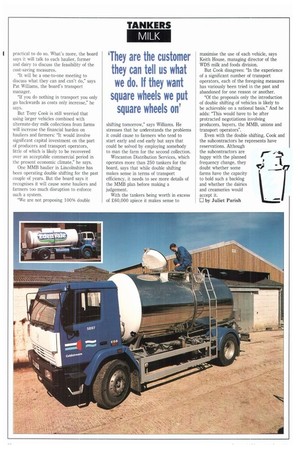TANKERS MILK
Page 38

If you've noticed an error in this article please click here to report it so we can fix it.
practical to do so. What's more, the board says it will talk to each haulier, farmer and dairy to discuss the feasibility of the cost-saving measures.
"It will be a one-to-one meeting to discuss what they can and can't do," says Pat Williams, the board's transport manager.
"If you do nothing in transport you only go backwards as costs only increase," he says.
But Tony Cook is still worried that using larger vehicles combined with alternate-day milk collections from farms will increase the financial burden on hauliers and farmers: "It would involve significant capital investment on the part of producers and transport operators, little of which is likely to be recovered over an acceptable commercial period in the present economic climate," he says.
One MMB haulier in Lincolnshire has been operating double shifting for the past couple of years. But the board says it recognises it will cause some hauliers and farmers too much disruption to enforce such a system.
"We are not proposing 100% double shifting tomorrow," says Williams. He stresses that he understands the problems it could cause to farmers who tend to start early and end early but says that could be solved by employing somebody to man the farm for the second collection.
Wincanton Distribution Services, which operates more than 250 tankers for the board, says that while double shifting makes sense in terms of transport efficiency, it needs to see more details of the MMB plan before making a judgement.
With the tankers being worth in excess of £60,000 apiece it makes sense to maximise the use of each vehicle, says Keith House, managing director of the WDS milk and foods division.
But Cook disagrees: "In the experience of a significant number of transport operators, each of the foregoing measures has variously been tried in the past and abandoned for one reason or another.
"Of the proposals only the introduction of double shifting of vehicles is likely to be achievable on a national basis." And he adds: "This would have to be after protracted negotiations involving producers, buyers, the MMB, unions and transport operators".
Even with the double shifting, Cook and the subcontractors he represents have reservations. Although the subcontractors are happy with the planned frequency change, they doubt whether some farms have the capacity to hold such a backlog and whether the dairies and creameries would accept it.
D by Juliet Parish
























































































